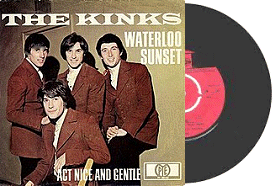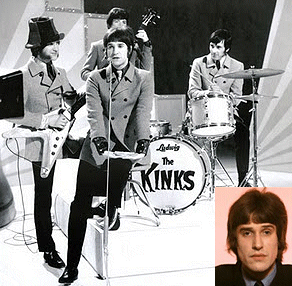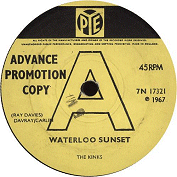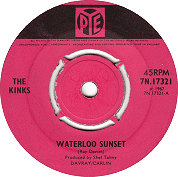|
Sixties
City presents
a wide-ranging series of
articles on all aspects of the Sixties, penned by the creator of the iconic
60s music paper Mersey
Beat
|
|||||
|
|
Although a 2004 radio
poll announced ‘Waterloo Sunset’ as ‘the greatest song about London’ and
Time Out was to call it ‘the anthem of London’, when Ray Davies was originally
composing the number he was initially going to call it ‘Liverpool Sunset’.
When ‘Penny
Lane’ by The Beatles was released around that time, Ray then decided to
change the location to London.
Ray was to reveal that the Englishness of his compositions was inspired
because The Kinks had been banned from appearing in America by the American
Federation of Musicians, who objected to the fact that British bands such
as The Beatles and Rolling Stones were dominating the American charts,
so they began to ban further British bands, including The Kinks. |
 |
 |
In an
interview in Uncut magazine in January 2009, Ray was to elaborate on the
creation of the song: "It came to me first as a statement about the death
of Merseybeat, but I realised that Waterloo was a very significant place
in my life. I was in St. Thomas' Hospital when I was really ill as a child,
and I looked out on the river. I went to Waterloo every day to go to college
as well". "The song was also about being taken to the Festival of Britain with my mum and dad. I remember them taking me by the hand, looking at the big Skylon tower, and saying it symbolised the future. That, and then walking by the Thames with my first wife and all the other dreams that we had. Her in her brown suede coat that she wore, that was stolen. And also about my sisters, and about the world I wanted them to have". "The two characters in the song, Terry and Julie, are to do with the aspirations of my sisters' generation, who grew up during the Second World War and missed out on the '60s. Sometimes when you're writing and you're really on good form, you get into the frame of mind where you think, I can relate to any of these things. It's something I learned at art school - let all the ideas flow out. But if you listen to the words without the music, it's a different thing entirely. The lyrics could be better but they dovetail with the music perfectly". There have been nine other recorded versions of the song, one by Ray with Damon Albarn, released on 2nd April 2002. The others were by Affairs of the Heart in 1983, Cathy Dennis in 1996, Barb Jungr in May 1999, the Fastbacks on 6th November 2001, David Bowie in 2003 (On February 23rd, 2003 David Bowie was joined on stage by Ray Davies and performed a duet of this song at Carnegie Hall in New York City for the Tibet House Benefit), Scrabbel on 26th July 2005, Peter Bruntnell in March 2006 and Def Leppard on 22nd May 2006. When Barb Jungr recorded the number she commented, “Ray Davies is just a brilliant song writer. I have loved this song for such a long time, and sung it for years. Living near the river, it’s a sunset I know”. ‘Waterloo Sunset’ is also the title of a book by Ray published by Viking in September 1997. |
  |
Dirty
old river, must you keep rolling Flowing into the night People so busy, makes me feel dizzy Taxi light shines so bright But I don't need no friends As long as I gaze on Waterloo sunset I am in paradise Every day I look at the world from my window But chilly, chilly is evening time Waterloo sunset's fine |
Terry
meets Julie, Waterloo Station Every Friday night But I am so lazy, don't want to wander I stay at home at night But I don't feel afraid As long as I gaze on Waterloo sunset I am in paradise Every day I look at the world from my window But chilly, chilly is evening time Waterloo sunset's fine |
Millions
of people swarming like flies 'round Waterloo underground But Terry and Julie cross over the river Where they feel safe and sound And they don't need no friends As long as they gaze on Waterloo sunset They are in paradise Waterloo sunset's fine |
|
Article
Text
UK
web hosting by
|